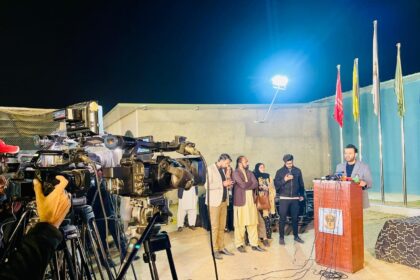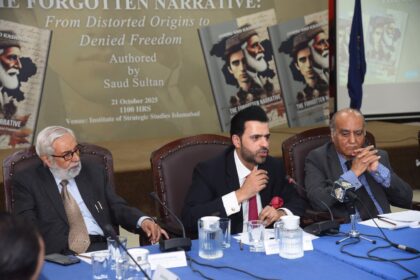Activists and Journalists Criticize Pakistan’s Information Commissions for Delays, Vacancies, and Weak Enforcement
Nadeem Tanoli
ISLAMABAD: On the International Day for Universal Access to Information, activists, journalists, and civil society members voiced frustration over the performance of Pakistan’s Information Commissions, citing long delays, vacant positions, political influence, and weak enforcement of Right to Information (RTI) laws. Their testimonies reveal a system struggling to live up to the promise of Article 19-A of the Constitution, which guarantees citizens access to public information.
Syed Kausar Abbas – Vacant Seats, Poor Implementation
Syed Kausar Abbas, Executive Director of SSDO Pakistan, highlighted that the civil society seat in the Pakistan Information Commission has been vacant since January 2024, while the Punjab Commission has faced a vacancy since March 2025.
Muhammad Akmal Malik – RTI Award Winner 2019
RTI award recipient Muhammad Akmal Malik described access to information in Pakistan as entering a “very difficult phase,” criticizing routine delays and incomplete replies.
Shakeela Jalil – Press Club Experience
Shakeela Jalil, ex-incharge of the Rawalpindi Press Club, acknowledged that in her personal observation and experience, the Right to Information (RTI) laws in Pakistan are a positive step, but their implementation faces many challenges. In some cases, government departments have provided timely and complete information, which she found encouraging. However, in most instances, she noted delays, a lack of seriousness, or outright refusals to share information. Many institutions do not take RTI requests seriously and often either fail to respond or provide incomplete material. She also highlighted delays and weak follow-up in the decisions of information commissions. In her view, if these laws are implemented effectively, institutions are held accountable, and public awareness is raised, then RTI can play a vital role in promoting transparency, accountability, and good governance..
Syed Raza Ali – Expert on Governance and Transparency
Syed Raza Ali observed that Many complaints at the federal and provincial levels are closed without addressing the concerns of complainants, which undermines trust in the Commissions. Vacant positions of commissioners in all five commissions—including the federal level, Punjab, KP, Sindh, and Balochistan—further delay implementation and weaken accountability. In KP especially, keeping these positions vacant appears to be a deliberate move to weaken the complaint redressal mechanism. These gaps not only discourage citizens but also erode the spirit of inclusion and participation that RTI laws are meant to protect..
Yasal Munim – Journalist’s Frustration
Journalist Yasal Munim recalled that the Pakistan Information Commission (PIC) was quite responsive, but my experience turned out to be different. When Zahid Abdullah was serving as Commissioner, he visited our newsroom to explain the importance of the Right to Information (RTI) and how to use it effectively. Having already spent three years in the newsroom at that time, the session felt like an eye-opener, offering a fresh perspective on access to public information.
Later, while working on a story about the number of Christian and Hindu prisoners in Lahore jails, I filed an RTI request. Initially, jail authorities assured me that the information would be provided, but eventually I was told the data was “not available.” Hoping for a more concrete response, I submitted a formal RTI request. Unfortunately, after almost eight months, the reply I received was inconclusive, leaving my query unanswered and the story incomplete.
That experience left me hesitant to file another RTI—not only because of the long delays, but also because there is no certainty that the requested data even exists with the concerned authorities.
Naeem Ahmed – Appeals Without Outcome
Naeem Ahmed from Faisalabad shared that My experience with PIC has been mixed. While most of my appeals have been entertained, in some cases the commission seemed to side with public bodies instead of holding them accountable. For instance, in a NEPRA case the appeal was closed despite non-disclosure, and my recent appeal against the Excise Director Islamabad has seen no progress for weeks. Even in an earlier case against the IGP Islamabad, incomplete information was provided with no action against the PIO. I cannot offer detailed comments on KPIC, as I have not filed appeals there in the past year. The Punjab Commission has been the most disappointing. Over 50 of my appeals remain pending—some since 2023—despite repeated reminders and lapsed statutory timeframes. Instead of enforcing compliance, the commission adjourns cases indefinitely without legal basis. Even requests for information submitted directly to the commission go unanswered. Rather than improving, information commissions in Pakistan seem to be losing effectiveness. To uphold the spirit of the International Day for Universal Access to Information, stronger political will, better capacity, and citizen-friendly procedures are urgently needed.
Dr. Raza Gardezi – Delayed Information Without Penalty
Dr. Raza Gardezi argued that my experience with the Pakistan Information Commission has been generally positive, as I did receive the information I requested, though often after delays beyond the timeline set in the Act. I strongly believe that once a request reaches the complaint stage, it should be treated as information denied, and if delivered only after appeal, it should count as delayed—warranting penalties for the officials concerned.
Regretfully, the Commission’s stance is that applicants should be content with simply receiving the information, which reduces citizens to a “beggars can’t be choosers” position. This undermines the very spirit of citizen supremacy and government accountability. Unless public bodies are penalized not only for denial but also for delay, the RTI regime will remain weak—a problem compounded by commissions dominated by bureaucrats.
Aun Ali – Quetta Journalist
Aun Ali from Quetta said my recent experience with the Pakistan Information Commission has been deeply disappointing. Appeals often remain pending for months, and some are rejected on minor technicalities, such as the absence of a legal certificate. Calls to the commission for updates are rarely answered. In one of my appeals, nearly eight months have passed since filing. Although an order was issued in my favor, the commission has failed to ensure its implementation—highlighting its inability to enforce its own decisions..
Ihtizaz Ahmad – KP Commission Positive
Contrasting other voices, Ihtizaz Ahmad described the KP Information Commission as responsive and cooperative, calling his experience “good.”
Naila Hamza – Politicization of RTI
Abbottabad-based RTI activist Naila Hamza described that the RTI Commissions in the federal government, Khyber Pakhtunkhwa, Sindh, and Punjab have become politicized, with decisions now appearing politically influenced. She described this trend as a “slow poison” that has discouraged many people from filing RTI applications. According to her, such decisions have disheartened citizens and undermined the very purpose of RTI. She added that if commissioners had been appointed on merit, the situation would have been very different.
Imtiaz Ahmed – Gilgit-Baltistan Perspective
Imtiaz Ahmed, founder of the Gilgit-Baltistan RTI Initiative, lamented that his region still lacks an RTI bill despite repeated advocacy. He urged the government to prioritize legislation for GB.
Naeem Sadiq – Structural Reforms Needed
Activist Naeem Sadiq said information commissions have become “toothless,” plagued by bureaucracy and political appeasement. He called for digitization, accountability, and structural reforms.












